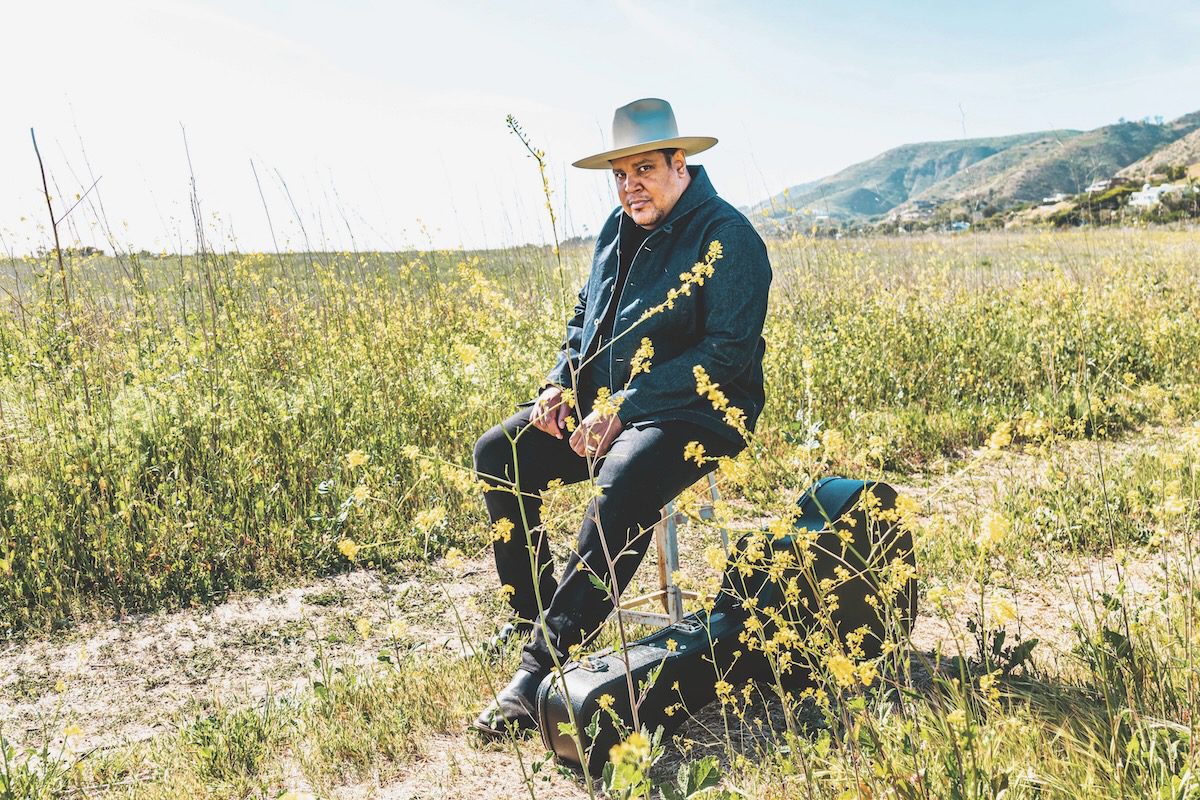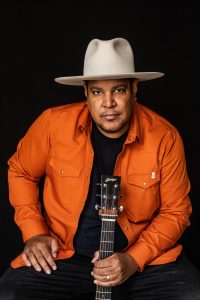Chris Pierce’s Long Road to Touring with Neil Young and ‘Let All Who Will’

Chris Pierce (photo by Mathieu Bitton)
The sun beat down relentlessly as the crowd filtered in late through the gates of the amphitheater in Ridgefield, Washington, where Neil Young was scheduled to play one of a handful of shows he’d booked in out-of-the-way venues for his first tour since the pandemic. Expectations and temperatures were running high as the listless crowd slowly made their way to their seats, a good half hour after the show was scheduled to begin. Everyone was there to see Neil, so when Chris Pierce, the opening act, walked onstage with his guitar, there was a palpable grumpiness in the crowd as he began to sing. Many people left their seats for a beer, while most of the remaining crowd chatted with their friends, scarcely acknowledging the singer on the stage.
If Pierce was daunted by the crowd’s seeming indifference, it didn’t show. He sang and played like a house on fire. Pierce’s verve and passion were impossible to ignore, and by his third song, a shift had taken place in the audience. The boisterous crowd returning with their drinks and food quietly took their seats. People in the aisles stopped talking and started listening closely. With his incredible, otherworldly voice, dynamic presence, and powerful guitar playing, Pierce was winning the crowd over as line by line, song by song they were drawn into his compelling narratives. There was a sense that something very special was taking place, and as his 45-minute set drew to a close, most of the crowd were on their feet, cheering and singing along.
To completely turn an audience around like that with such mastery and easy confidence is something that only a very few artists can ever achieve. There was a feeling among the audience that they had witnessed something special, and more than a few people, as they wandered out during set break, asked their friends, ‘Who was that guy, and why haven’t I ever heard of him before?’
That’s a good question, because Pierce is certainly not a beginner. He has been an influential performer in the Los Angeles roots music scene for many years, and Let All Who Will, his new record produced by David Resnik and Niko Bolas, Neil Young’s long-time musical foil, is the 11th album he’s put out under his name since his debut, Liberation Vol. 1, came out in 2002.
Pausing for a call amid preparations for a headline tour for Let All Who Will, Pierce was still glowing from the experience of touring with Young. “I met with Neil early on the tour, and he said, ‘Man, we love having you here. The audiences love you, so just keep on doing what you’re doing!’” Pierce recounts. “That gave me so much fuel for the rest of the journey. So, every night, I would go on and switch things up and try and connect as much as possible, keeping in mind that heart and soul is the essence of my music. So I really tried to let that come through and do the speaking.”
It’s clear that Let All Who Will, out Sept. 1 via Friends at Work / Downtown Distribution, is a very special record for him, both personally and professionally.
“This new album is really about feeling empowered,” Pierce says. “It’s about people living with empathy and continuing the fight for equality and justice, and about being strong and cheerful even when the shadows of the night fall upon them. It’s like, at the start of the pandemic, I felt that we had this quick moment where everybody was home and their hearts were a little bit more open. I tried to dig and get in there while the getting was good. These new songs grew out of all that.”
Hearing Between the Lines
Pierce’s compositions are anthemic in their scope, yet intimate and personal in their focus. His lyrics often zero in on characters at the brink of a crucial choice or change.
“The listener may feel like they’re witnessing someone standing on the edge of a decision,” he explains. “The song ‘Mr. McMartin’ is about a street sweeper who’s been cleaning up garbage in the same place for 40 years, but he hasn’t seen anything change. Then he dies, and he’s still sweeping up people’s broken promises and broken prayers.”
It’s one of the many compelling stories that Pierce shares on Let All Who Will, and one has to wonder where his ideas come from. A person doesn’t wake up one morning able to write songs like “Meet Me at the Bottom” or “American Silence.”
“It’s been a journey, down a long road,” Pierce admits. “Fighting for compassion and empathy were things I saw my parents do. They were the first interracial couple on my block, and I saw them move through difficulties in a way that allowed them to express love to everyone around them. When I was young, someone burned a cross on our front lawn. My parents responded by inviting friends over for picnics on that same front lawn to demonstrate togetherness and love and diversity. That’s how we have to do it. We have to find ways to move together.”

“I have worked hard every single day of the past 35 years to make sense of sound and my own voice,” Pierce says. “It’s really been a test of how much I love music, and how much I’m willing to fight for it. The answer has always been that this is my life and I’m willing to fight forever for this. This is what I’m supposed to be doing.”
Listening to Pierce sing, it’s almost impossible to compute that he can’t hear much of what he shares with his audience. Few singers are gifted with such an amazing range and ability to swoop from high and low notes, often in a single phrase. The only explanation that he can offer is that deafness has made him listen harder.
“I don’t hear the leaves crackling or the rain falling like you do, so I have really learned to listen with what I have. I look at deafness as a superpower. I feel like I hear things that aren’t there. I read between the lines. When you don’t hear, you have to get in there and sing from the gut with the fearlessness that deafness allows me to have.”
Pour a Little Sugar
Recalling many of the great topical soul songs of the past, like “A Change Is Gonna Come” and “What’s Going On,” the sweet tone of Pierce’s delivery often transforms the dire situations described in his music into something more digestible. “It wasn’t a conscious decision,” he says. “I was raised on a lot of the great soul singers like Solomon Burke and Arthur Adams. My dad grew up singing in the African Methodist Episcopalian church down South, and I love that tradition where you add some sweetness to the message and pour a little sugar on it to help it go down easy.”
But Pierce could never be accused of writing easy listening music, no matter how sweet the delivery. In one way or another, almost every song on Let All Who Will explores what it means to be American at such a challenging time in its history. “Get Yourself Right,” and “Ain’t No Better Time” could be about a love gone wrong, and according to Pierce that interpretation is not too far wrong: “To be American right now is like being in a relationship with somebody that you know can be a much better person, but they keep letting you down. It’s like, I want to stay here and embrace what you’re giving me, but you keep pulling away and shutting down, and giving me more reasons to leave. It’s complicated.”
Pierce is quick to put out that his songs aren’t about pointing fingers at people, they’re about pointing fingers at injustice. He cites the title song, “Let All Who Will,” as an example of this. Uncompromising, yet hopeful, it’s as passionate a call to change as a person could ever hope to hear.
For Pierce, music is inseparable from the rest of life. There are no divisions. The Chris Pierce you hear on stage is the same Chris Pierce you would meet in the grocery store line. And whether he’s talking about his songs or the state of the world, it is hard to imagine anyone not being drawn to a viewpoint that expresses so much optimism in the face of such unimaginable personal adversity.
“At the end of the day, I want to find a way to bring us all together,” Pierce says. “I think that the best way I can do that is to express vulnerability and compassion through my songwriting. Lots of people mistake compassion for weakness. It’s not. It’s the only way forward. If we’re going to make it in this human condition, we have to find a way through compassion to love.”





